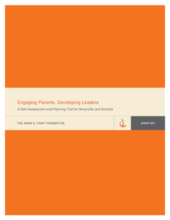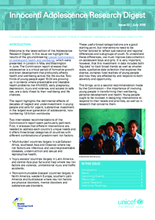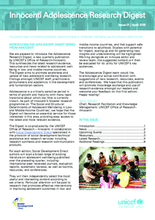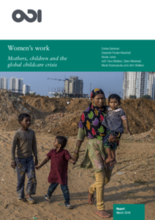Displaying 201 - 210 of 349
The current study examined the impact of transitions on foster children’s adjustment to a new placement in out-of-home care in the US.
This paper analyses how social support enhances family resilience in kinship foster families by involving the families in an educational group programme.
This self-assessment and planning tool is intended for nonprofits and schools working with families to provide services that more effectively reach and engage parents in fostering their children's development.
This issue of Innocenti's Adolescence Research Digest includes recent news, events, and other updates as well as links to some of the latest research on adolescents and violence, health, education, street-connected youth and more.
The State of the World’s Children report presents research from around the globe on the status of children, particularly those who are most disadvantaged, and their wellbeing.
Aiming to support the design of effective intervention strategies, this study examines the hypothesized causal effect of foster children's poor school performance on subsequent psychosocial problems, here conceptualized as economic hardship, illicit drug use, and mental health problems, in young adulthood.
The Adolescence Research Digest is a new quarterly publication by UNICEF’s Office of Research-Innocenti. This synthesizes the latest research evidence, resources and news related to adolescent well-being in low- and middle-income countries.
Large scale studies published in the 1990s and early 2000s generally showed that significant educational disparities existed based on orphan status and a child's relationship to the head of the household. Since the data relied on by these studies were collected, the global community has conducted major campaigns to close these gaps, through the Education for All (EFA) and Millennium Development Goals (MDGs). This study examined these factors using eight country-years from five sub-Saharan African countries (Malawi, Mozambique, Niger, Uganda, and Zimbabwe).
This report and summary explores the current childcare policy failures across a range of case-study countries, including Viet Nam, Gaza, Mexico, India and Ethiopia, and highlights examples of progress in countries which are successfully responding to these challenges.
This handbook has been developed specifically for Save the Children program staff, implementing partners, and practitioners supporting education programs in any context.






